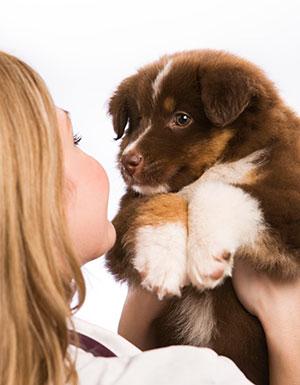
Responsible Pet Owner
Thursday, March 2, 2017
Whether you own a dog, a cat, a horse or a reptile, pet ownership comes with responsibility.
How can you be a responsible pet owner?
Pets are companions that need love, care and devotion. PetSafe® and Morris Animal Inn offer this advice on owning a pet:
- Make your pet part of the family. Pets, especially dogs, need companionship. Traditionally pack creatures, dogs need the warmth and love that comes with living indoors with their family.
- Pet proof your home. Research what household products, plants and foods can harm your pet. Make sure these are kept in a secure location so your pet cannot get into them.
- Care for your pet. Annual visits to your veterinarian, including an oral exam, are important to catch any problems early. You may wish to insure your pet. Emergencies can happen at any time. Pet insurance will help get your pet the care it needs no matter the cost.
- Groom your pet as often as required for their specific breed. Keep your pet’s coat clean with regular trimming, brushing and baths. Keep your pet’s nails (dogs and cats) at a comfortable length.
- Practice good hygiene. Beyond grooming, pets need clean ears and teeth. Brushing teeth daily is the cornerstone of dental health for dogs, cats and people. When recommended by your veterinarian, dental cleanings should be performed to remove plaque and tartar.
- Spay and neuter your pet as early as six months of age. Help control pet overpopulation. Studies show spayed/neutered pets live healthier, longer lives. Plus spayed/neutered pets are less likely to develop behavior problems.
- Always keep an ID tag on your pet. Microchip your pet and keep the information current to help identify your pet if it is lost or stolen.
- Train your pet to understand obedience. Dogs should at least know basic direction like “sit” and “stay.” In an emergency situation, these cues could save your pet’s life.
- Exercise your pet. All pets need regular exercise to stay fit and to release their energy. Without it, your pet may begin to act out. Young pets that do not get enough exercise are more likely to develop negative behavioral issues that lead many people to give up their pet.
- Clean up after your pet. Whenever you take your dog for an outing, bring some bags to pick up after your dog. This helps prevent the spread of diseases and assures a clean environment for everyone to enjoy. Do the same for your cat. Clean the litter box often so they have a clean space to do their business.
- Feed your pet properly. Ask your veterinarian what type of food and how much is right for your pet. Keeping your pet on a regular, portion controlled diet will help with weight management and prevent weight related health issues.
- Socialize your pet. Meeting new people and other pets improves the confidence of your pet. Plus, having extra playmates will help relieve some of your pet’s energy.
- Travel safely. From crates, to harnesses, to safety nets, there are many options on the market to keep your pet safe in the vehicle. Do not leg your dog ride in bed of a pickup truck.
Most important, love your pet. You are your pet’s favorite thing in the whole world. Your pet craves your love, attention and care. Give your pet the love and devotion it shows you.
by Elisabeth Giedt, DVM
